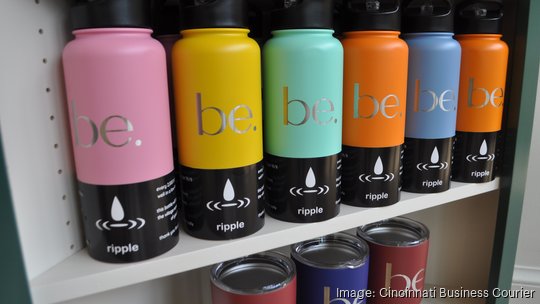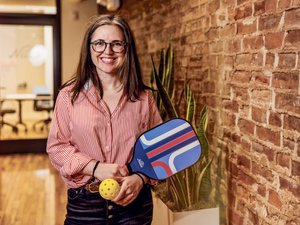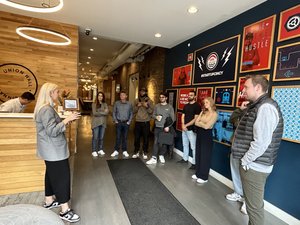
Joe Knopp launched Ohio-based startup Ripple from his college dorm room in November 2020 with a simple goal: to sell 2,000 water bottles to build one well in a remote village in Uganda.
Now, 22 wells later – and roughly 20,000 water bottles sold – Knopp has officially exited the business. The buyers, two brothers-in-law based in the Cleveland/Akron area, plan to invest significantly to further Ripple’s mission and marketing reach, he said.
Knopp, who moved to Cincinnati in May 2022 after graduating from Walsh University in North Canton, has already jumped headfirst into his next venture, called Mica. He quietly joined the most recent Ocean Accelerator cohort, which kicked off in May.
He remains a minority owner in Ripple and will stay on in an advisory role. That was key in the deal, said Craig Kohrs, the company’s new CEO.
Terms of the acquisition, which closed in early June, were not disclosed but Knopp put it in the “healthy six figures.”
“It was time,” Knopp told me. “I was only supposed to build one well (with this) and that's all I really wanted to do, and it just turned into more. We grew extremely fast – all without any email marketing, without any paid ads. There’s a different skillset involved now, and there's so much potential to create more impact.”
Knopp said he decided to list Ripple on acquire.com, an online marketplace where founders can buy and sell startups.
That’s where Kohrs, who lives in the Akron area, and his brother-in-law, Ryan Mifsud, who lives in Cleveland and is now Ripple’s chief operating officer, found the listing.
They had just sold their last business after 14 years and fell in love with the company’s mission.
Ripple water bottles support a cause. For every 2,000 sold, the company builds a well for a community in need of clean water.
The business has plenty of potential. Ripple reported about $100,000 in revenue in year one, a number that grew 100% to $200,000 in year two. And that was with virtually zero paid marketing outreach.
“We're looking for something that had a little more meaning, and we loved the idea that for-profit can create sustainable contributions to our world,” Kohrs said.
Knopp said the new owners plan to pour in investment dollars to grow Ripple’s reach. Although he declined to give a figure, Kohrs said that commitment “is far and beyond” what the company has ever been able to make before.
Kohrs and Mifsud have already put into motion some changes. Ripple is currently only available in one size: a 32-ounce, double-wall, vacuum-insulated bottle, although it comes in a variety of colors.
Kohrs said they’re looking at different bottle sizes and bottle designs.
Ripple has largely sold B2B, or business-to-business. But building up a B2C, or business-to-consumer, pipeline will be a focus as well, Kohrs said.
Ripple continues to work with Xavier Element, the university’s student-led marketing and consulting firm. Ripple’s initial work with Xavier Element is how Knopp made inroads with the Cincinnati ecosystem.
The goal is to build a cadence to where the company is funding one to two wells a month. According to the Centers for Disease Control, 2 billion people lack access to clean water. About 1.2 million people die each year as a result, mostly children.
“We have the luxury of looking at this as a long-term investment. This is not something we’re trying to flip,” Kohrs said. “Joe did exactly what you want to hear from a founder. He bootstrapped it to this place where a lot of people are really excited to hear about it and act on it. Now it's trying to get that story out to more and more people. We want to make every dollar go further.”
In terms of his next venture, Knopp, who is 22, said he’s been loosely building out the idea for Mica for the past six months. It’s more tech based. It will take features used by for-profit companies like Notion, HubSpot or Salesforce and bring them to the nonprofit sector to help manage donations. It will also focus on innovative ways to enable micro, or round-up, donations. Those allow donors to round up their purchases to the nearest dollar to aid specific projects.
With Ripple, he launched the company with the entire $12,000 he had earned from a college internship to buy the bottles.
The company never raised outside capital, although it did land a grant from Main Street Ventures earlier this year. The funding, which was not disclosed, aims to help revenue-generating businesses scale and increase their odds of survival.
Knopp said he’s open to venture funding this time around. Ocean Accelerator will help guide that path from day one.
“Now it’s about focusing on uplifting all the other nonprofits around the world,” he said.








